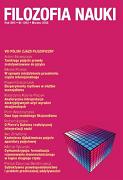Tarskiego pojęcie prawdy zrelatywizowane do języka
Tarski’s relativised to language notion of truth
Author(s): Adam NowaczykSubject(s): Philosophy
Published by: Uniwersytet Warszawski - Wydział Filozofii i Socjologii, Instytut Filozofii
Keywords: Alfred Tarski; truth; semantic definition of truth
Summary/Abstract: Tarski believed that the notion of truth should be relativised not to the notion of meaning — as many philosophers would claim — but rather to the notion of language. In general terms, he would identify a language with a structure L = <A, S, Cn> containing an alphabet, a class of sentences and an operation of consequence. As to the specific languages of deductive sciences Tarski maintained that they should be inseparably conjoined with theories, so that the notion of language should be supplemented with a set of axioms and a set of true sentences: L’ = <A, S, Cn, Ax, Ver>. First four elements of L’ are quite conveniently expressable in syntactic terms. About the set of Ver, to the contrary, it can be said only that it is one of many complete and coherent sets of sentences containing Ax and closed for the operation Cn. For a very general characteristic it could perhaps be enough. For a more specific definition of Ver, however, Tarski needed some semantic tool. As is well known, he used the notion of satisfying, defined for every particular language L* . Thus, as it seems, according to Tarski, the general notion of truth relative to language is a primary notion of the theory of formalized languages. Were we after introducing it as a secondary notion, we would have to enrich the notion of language with some semantic (referential) aspects, what in turn would require some standarization of syntax and thus narrow the notion of formalized language.
Journal: Filozofia Nauki
- Issue Year: 17/2009
- Issue No: 1 (65)
- Page Range: 5-12
- Page Count: 8
- Language: Polish

